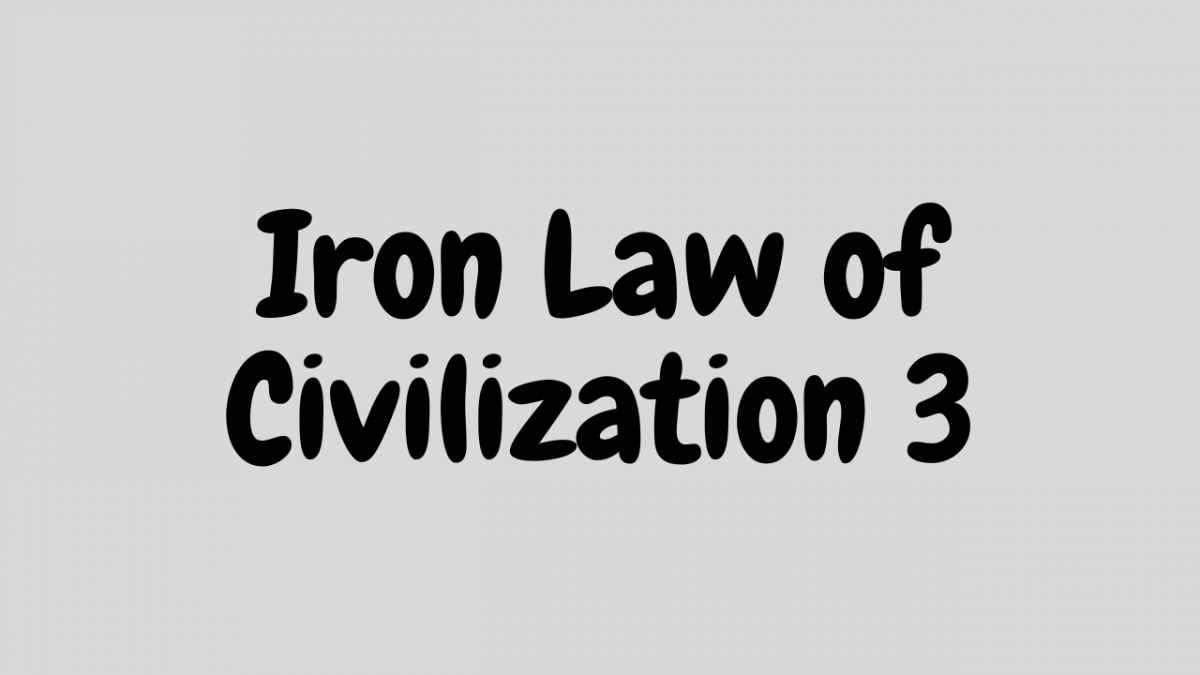Introduction
In the realm of decision-making, the human mind is both a powerful tool and a complex apparatus. It is susceptible to various biases and fallacies that often hinder our ability to make rational choices. One such cognitive pitfall is the Iron Law of Civilization 3, a mental model deeply rooted in human psychology that influences our decision-making processes. Understanding this concept is crucial for avoiding the traps of irrationality and making better choices in all aspects of life.
Defining the Iron Law of Civilization 3
The Iron Law of Civilization 3 can be succinctly defined as the tendency for individuals or groups to make decisions that prioritize short-term gains and immediate satisfaction over long-term consequences, even when it is contrary to their best interests. It stems from a basic human desire for instant gratification and a tendency to discount the future. This mental model is anchored in the interplay between our emotions, cognitive biases, and the dynamics of modern civilization.
Relevance of the Iron Law of Civilization 3 in Decision-Making
The Iron Law of Civilization 3 pervades our daily lives, affecting personal, business, and public policy decisions. By succumbing to this fallacy, individuals and groups often make choices that lead to unfavorable outcomes in the long run. Let’s examine three distinct examples to illustrate the occurrence of this mental model in different contexts:
- Personal Life Decisions: Consider the scenario of an individual grappling with their health. They are aware that maintaining a balanced diet and exercising regularly is essential for long-term well-being. However, due to the lure of immediate gratification, they consistently indulge in unhealthy food and neglect physical activity. In the short term, they may experience pleasure from indulging in tasty but unhealthy meals, but over time, their health deteriorates, leading to chronic conditions and diminished quality of life.
- Business Scenarios: In the business world, the Iron Law of Civilization 3 can manifest when companies prioritize short-term profits over sustainable practices. For instance, a manufacturing company might cut corners on environmental regulations to maximize immediate financial gains. Although this decision may yield short-term benefits, it can damage the company’s reputation, lead to legal issues, and harm the environment, ultimately resulting in long-term consequences detrimental to both the company and society.
- Public Policy-Making: Governments, too, can fall prey to the Iron Law of Civilization 3 when formulating policies. For example, a government facing economic challenges might resort to excessive borrowing and deficit spending to stimulate immediate economic growth. While this may provide a temporary boost, it can lead to long-term consequences such as inflation, mounting debt, and an unstable economy, burdening future generations with the consequences of shortsighted policies.
Mental Biases and Psychological Underpinnings
Several cognitive biases contribute to the prevalence of the Iron Law of Civilization 3. The bias of hyperbolic discounting, wherein we assign disproportionate value to immediate rewards, plays a significant role. Our tendency to prioritize present gains over future benefits is amplified by the optimism bias, which leads us to believe that negative consequences are less likely to affect us personally.
Additionally, status quo bias, loss aversion, and anchoring bias can all contribute to our irrational decision-making. We often prefer to maintain the current state of affairs, fearing potential losses and being anchored by past experiences or initial information, even if it contradicts logical reasoning.
Strategies to Identify and Avoid the Iron Law of Civilization 3
Recognizing when we might be succumbing to the Iron Law of Civilization 3 is crucial for making more objective decisions. Here are some practical strategies to help us identify and avoid this mental trap:
- Awareness and Self-reflection: Cultivate awareness of our decision-making processes and actively reflect on our choices. Consider the long-term implications and potential trade-offs of immediate gratification.
- Delayed Gratification: Practice delaying rewards and cultivating patience. By training ourselves to delay immediate pleasures, we can develop a mindset that values long-term benefits over short-term gains.
- Utilize Decision Frameworks: Employ decision-making frameworks like cost-benefit analysis, scenario planning, and system thinking to objectively evaluate options and assess potential outcomes. This helps to counteract impulsive decision-making driven solely by short-term desires.
- Seek Diverse Perspectives: Engage in discussions and seek input from others with different viewpoints. By considering alternative perspectives, we can challenge our biases and gain a more comprehensive understanding of the potential consequences of our decisions.
Conclusion
The Iron Law of Civilization 3, deeply anchored in human psychology, has a pervasive influence on our decision-making processes. By prioritizing immediate gratification over long-term consequences, we often make choices that contradict our best interests. Recognizing and actively avoiding this mental trap is crucial for making rational decisions in personal, business, and public policy contexts.
By cultivating self-awareness, practicing delayed gratification, utilizing decision frameworks, and seeking diverse perspectives, we can mitigate the effects of the Iron Law of Civilization 3 and make more informed choices. Ultimately, the value of awareness and active avoidance of this mental trap lies in our ability to navigate life’s complexities and strive for long-term fulfillment and well-being.
